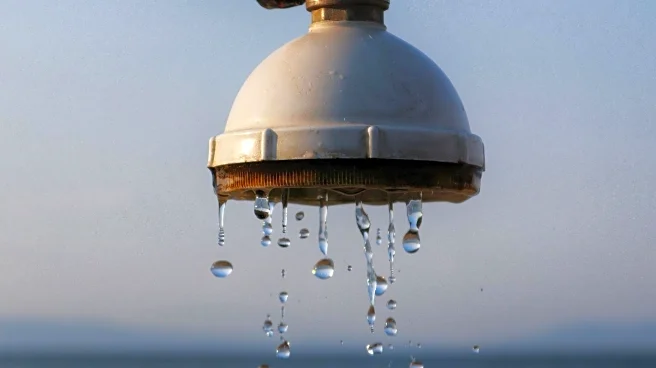What's Happening?
Experts are advocating for shorter shower durations as a means to conserve water and reduce energy consumption. The Environmental Protection Agency (EPA) highlights that water and wastewater treatment
can account for 30 to 40% of a city's total energy use. With the United Nations projecting that global demand for freshwater will exceed supply by 40% within five years, the need for water conservation is becoming increasingly urgent. Dermatologists also caution against long showers, which can strip the skin of natural oils, leading to dryness. They recommend limiting showers to 5 to 10 minutes to maintain skin health and reduce water usage.
Why It's Important?
The push for shorter showers is significant in the context of growing water scarcity and environmental sustainability. Reducing shower time not only conserves water but also decreases the energy required to heat and pump it, thus lowering household utility bills. This conservation effort is crucial as regions worldwide face 'megadroughts' and water shortages. In the U.S., the average shower uses approximately 15.8 gallons of water, and cutting shower time can significantly reduce this consumption. This collective action can alleviate pressure on municipal water systems and contribute to broader environmental conservation efforts.
What's Next?
As awareness of water scarcity grows, individuals and communities may adopt more water-saving practices, such as using timers or playlists to limit shower duration. Policymakers and environmental organizations might also promote educational campaigns to encourage water conservation. Additionally, technological innovations in water-efficient fixtures and appliances could become more prevalent, further aiding in the reduction of water and energy use. These efforts could play a critical role in addressing the impending global water crisis and ensuring sustainable water management practices.
Beyond the Headlines
The emphasis on shorter showers also reflects a broader cultural shift towards sustainable living and environmental responsibility. As individuals become more conscious of their ecological footprint, lifestyle changes such as reducing water usage can contribute to a more sustainable future. This movement may also influence consumer behavior, driving demand for eco-friendly products and technologies. Furthermore, the focus on water conservation highlights the interconnectedness of environmental issues, where individual actions can collectively lead to significant positive impacts on global resources.









